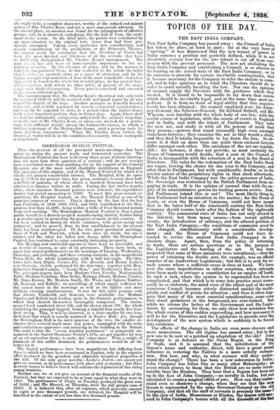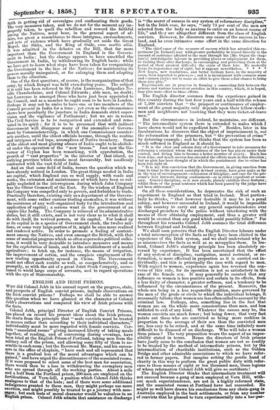TOPICS OF THE DAY.
THE EAST INDIA COMPANY,
THE East India Company has passed away ; the Council of India has taken its place, at least in part ; for at the very hour of " moving " it was discovered that the new tenant of power in India assumes a position not perfectly defined, while it is not absolutely certain how far the late tenant is cut off from con- nexion with the present possessor. The new act abolishing the East India Company and establishing a Council, is so obscure is its bearing on the actual state of the East India Company, or in its omission to provide for certain inevitable contingencies that it became necessary for the Company to refer the statute to wee_ sel, and to take opinions as to what the Directors should do in order to avoid actually breaking the law. Nor can the opinions of counsel supply the Directors with the guidance which they needed. It is found to be impossible to lay down that course which should be inevitably legal, and at the same time most ex- pedient. It is from no want of legal ability that this negative result has been obtained ; the counsel employed were the Attor- ney-General, the Solicitor-General, Sir Richard Bethell, and Mr. Wigram, men familiar with the whole body of our law, with the recent course of legislation, with the course of events in England and in India, and with the intent of Parliament. They take the new act, and study it with all the powers of mind that they possess,—powers that stand unusually high even amongst statesmen-lawyers ; they examine the act as they would a chart, and they find it totally impossible to lay down the line. So ob- scure is it that on more than one point these eminent lawyers differ amongst each other. The omissions of the act are remark- able ; for instance, it does not provide, as most certainly the House of Commons would decide, that a seat at the Council of India is incompatible with the retention of a seat in the Board of Directors. The rules for the redemption of the East India Stock are vague, leaving the choice for one year to the Company, and after that to Parhament, but with considerable doubts as to the precise nature of the proprietory rights in that stock afterwards, While the East India Company was the active governor of India, the Sovereign was restrained by the British Parliament from en- gaging in trade. It is the opinion of counsel that with the ex- piry of its administrative powers its trading powers revive. Now, did Parliament intend this or not ? The most likely thing is, that Parliament had no intention in the matter ; for the House of Lords, or even the House of Commons, could not have meant that in the latter half of the nineteenth century the East India Company should resume trade after the fashion of the eighteenth century. The commercial state of India has not only altered in the interval, but from many causes,—from recent political events, the introduction of railways, and the altered position of the East India Company,—the conditions of commerce must be also changed, simultaneously with a considerable develop- ment; and the House of Commons could not have in- tended to revive the ancient East India Company in its obsolete shape. Apart, then, from the policy of returning to trade, there are serious questions as to the purpose of the Legislature and the bearing of the act. It has been suspected that some of these omissions were intentional,—that the power of retaining the double seat, for example, was an official surprise of an inadvertent Legislature ; but this is to seek for re- mote causes where a sufficient cause is close at hand. We have seen the same imperfections in other countries, when attempts have been made to octroyer a constitution for an empire off hand. In such a task, where the system to be superseded has been so complicated, and that which is to come into practice must neces- sarily be so elaborate, the mind even of the ablest and of the most numerous Council "becomes utterly distracted amidst the multi- plicity and conflict of points for attention ; and thus it often hap- pens that many of the most essential considerations, some even that stand prominent in the foreground, are over-looked. But while we excuse the laches of the Government and the Legis- lature by accounting for them, we only show how mistaken was the whole course of this sudden superseding, and how necessary it will be for the Executive and the Legislature to preside over the development of the new system which is suddenly to be forced into existence.
The effects of the change in India are even more obscure and more momentous. The old regime has passed away ; but is the new one to be new or a patched up adaptation of the old ? John Company is as defunct as the Great Mogul, or the King of Oude, and it is assumed that the substitution of the Queen's name and authority, direct, will have a great moral . influence in restoring the Natives to a more orderly submis- sion. But how, and why, in what manner will they under- stand the change ? There has been a new subversion in India; John Company has fallen like so many other Maharajah; an event which proves to them that the British are no more invul- nerable than the Hindoos. They hear that a Begum has been set up in the face of John Company,—no novelty in India, but not calculated to create a magical effect of awe. How can they under- stand even so shadow a change, when they see that the new Queen is represented by the same Governor-General as the old Company, and that all the staff of servants is precisely the same' In the eyes of India, Hussulman or Hindoo, the Queen will suc- ceed to John Company's tenure with all the discredit of his bad faith in getting rid of sovereigns and confiscating their goods. The very measures taken, and we do not for the moment say im- properly taken, to quell the rebellion and reward the faithful 'wog the Natives, must bear, in the general aspect of af- fairs, too great a resemblance to those intrigues, encroachments, and acts of violence which have gradually set aside the Great Mogul, the Sikhs, and the King of Oude, cum multis aliis. It was admitted in the debates on the Bill, that far more important than the Government in England is the Govern- ment in India ; but the change appears to have unsettled the Government in India, by withdrawing its English basis ; while we have got to learn what steps have been taken for reorganizing the Government in the face of the Natives ; for maintaining its powers morally Unimpaired, or for enlarging them and adapting them to the situation. One of the first questions, of course, is the reorganization of that army, by which Bengal was held even during peace. The subject it is said has been referred to Sir John Lawrence, Brigadier Ne- ville Chamberlaine, and Colonel Edwards ; able men, no doubt; but Lawrence is amongst those who have just been appointed to the Council, and as a member he ought soon to be here in London. Perhaps it may not be amiss to have one or two members of the Council present in India for a time ; yet even so the circumstance shows how peculiarly the juncture in India demands strict super- vision and the vigilance of Parliament; but we are in recess. The Civil Service is to be reorganized and extended and reno- vated in its spirit ; for it is to be presumed that with indirect Government will disappear many of the anomalies of Govern- ment by Commissionership, in which one Commissioner counter- acts another, until the ablest officials become, through the routine and intrigues of red tape, accomplices of Native treachery. Some of the oldest and most glaring abuses of India ought to be abolish- ed under the operation of the "new broom." Just now the Go- vernor of Ceylon has been remarking, with approbation, the growth of "vast properties" in the interior of that island, an outlying province which stands most favourably, but needlessly contrasted with the vast field of India.
And on that same field of India, recurs the question which we have already noticed in London. The great things needed in India are capital, which England can so well supply-, with roads and works, the extension and maintenance of which have been so cul- pably neglected in the interregnum during which John Company was the Oliver Cromwell of the East. By the wisdom of England the Company was compelled only to govern, and forbidden to trade. Practically therefore existing only as a department of the Govern- ment, with some rather curious trading anomalies, it was without the assistance of any well-organized body for the introduction and application of capital ; a serious want in the government of an empire like India. The Company is relieved of its administrative duties but it still exists, and is not very clear as to what it shall do with itself, its revived powers, or its capital. For looked up as its capital is in a species of Government stock, the twelve mil- lions, or some very large portion of it, might be once more realized and rendered active. In order to promote a feeling of content- ment among the Natives, and even amongst the British, with that sense of material progress which so often supersedes political sulki- ness, it would be very desirable to introduce measures and means for the exploitation o-f lands and for the establishment of a model agriculture ; to fetch up, for instance, the means of irrigation, the improvement of cotton, and the complete employment of the new trading opportunity opened in China. The Government could not effect such results so well, so comprehensively, and so promptly, as with the aid of a great Joint Stock Company, accus- tomed to wield large corps of servants, and to regard operations with the eye of Statesmanship.



































 Previous page
Previous page